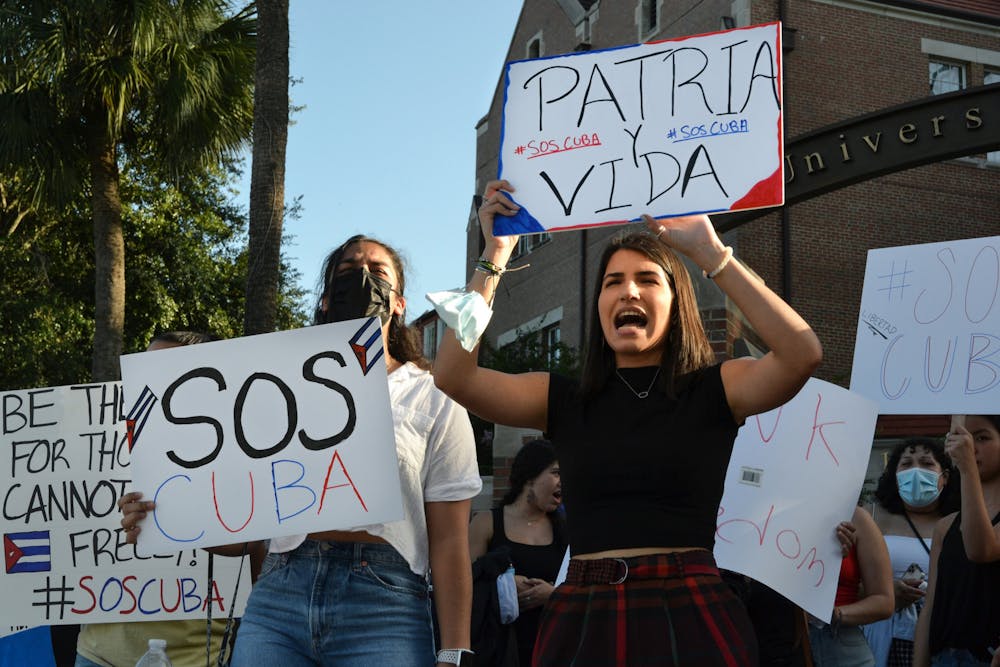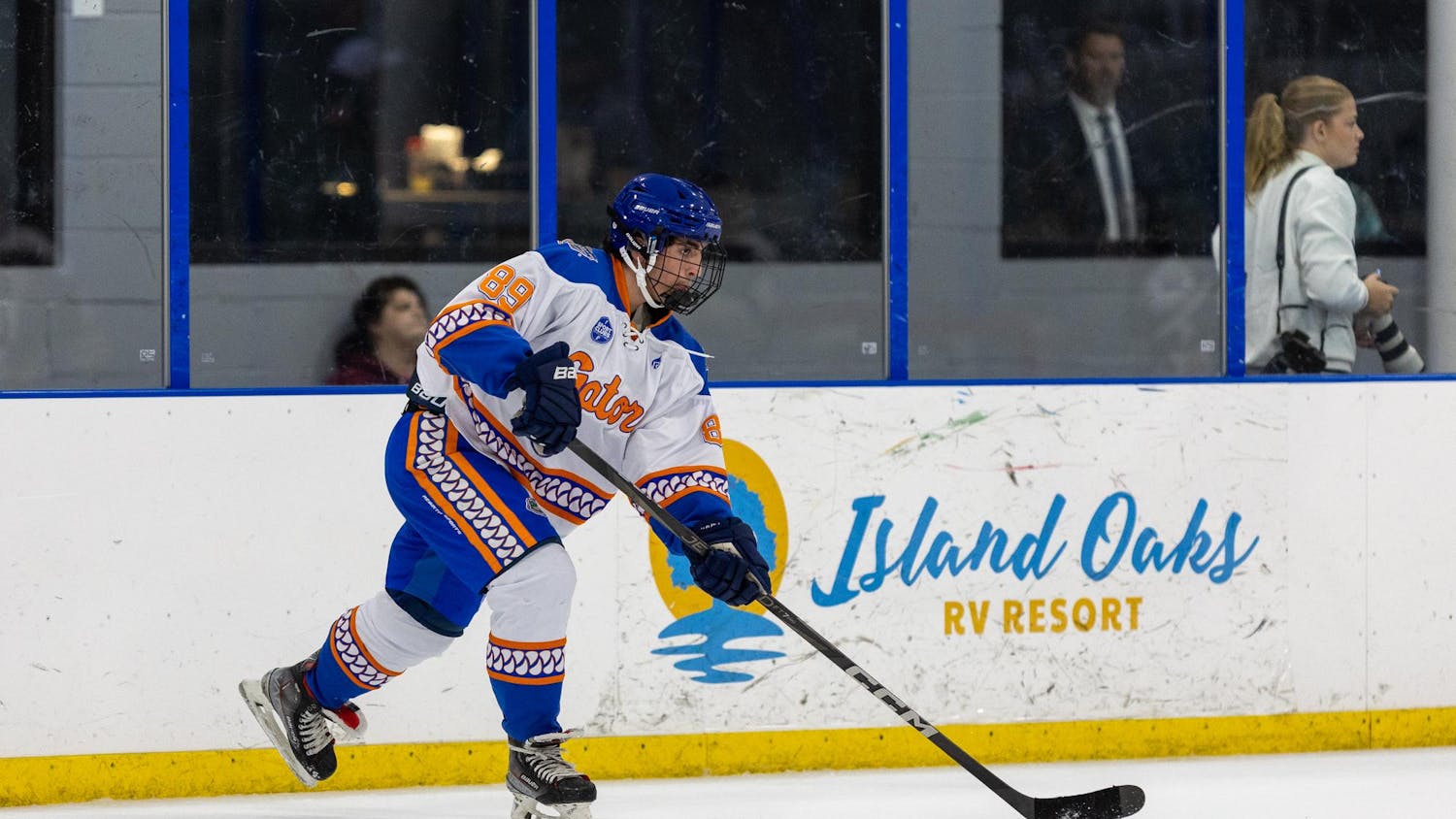Protestors sprawled across the corner of West University Avenue and Northwest 13th Street July 16.
The #SOSCuba Gainesville demonstration — hosted by UF students from Take Action Florida, a social activism group — garnered support from about 70 students and Gainesville residents who called for action to change current conditions in Cuba.
The protests are in response to food and medicine shortages, inflation, nationwide blackouts and a rise in COVID-19 deaths on the island in the past month. Thousands of Cubans both in the country and in the U.S. are demonstrating to express frustrations against the current government’s rule.
The government in Cuba detained protestors through mobilizing police and military units and took teenagers from their homes to fight alongside the government, sometimes against their own families, according to a CBS Miami article.
“It's literally civilians versus the military at this point,” Sayda Chinilio, a 21-year-old UF elementary education senior, said. “Kids my age are being taken from their homes to fight against their own people.”
Chinilio’s stepdad was forced to enlist in the military at 15 years old in Cuba. After delaying his draft, he was imprisoned and sent to a labor camp where he cut sugar cane. Years later, he escaped to Mexico and eventually arrived in Miami.
Today, Cuba is governed by Miguel Díaz-Canel Bermúdez, whose administration has experienced limited medicine and vaccination availability, contributing to the rise in the country’s COVID-19 death toll.
Cuba’s economic crisis is partly due to the lack of tourism — one of their main sources of income — from existing U.S. travel restrictions and current restrictions on travel imposed during the COVID-19 pandemic. This, along with the government's rationing system, has contributed to soaring prices and scarcity of food, according to Amnesty International’s 2020 report on Cuba.
Now, Chinilio said her stepdad’s family is starving.
“We have no way of communicating to them,” she said. “It hurts a lot to see what's happening.”
Chinilio says she is not supportive of U.S. intervention, but thinks it’s necessary because of how bad the situation is on the island.
Protests showing solidarity with Cuban protesters have sprung up from Miami to Chile. The #SOSCuba demonstration was the third protest against the Cuban government to take place in Gainesville last week.
“The reason people are protesting right now, it's not one thing, they're protesting because they're tired of everything,” Sophia Medina, an 18-year-old UF exploratory freshman, said.
For more than two hours, the crowd chanted “libertad,” the Spanish word for liberty.
Alexandra Quintana, co-founder and vice president of Take Action Florida, organized the demonstration to create a haven for people to express themselves and heal while building empathy and raising awareness about the humanitarian crisis in Cuba, she said.
“I am trying to garner as much attention to the issue,” she said, “because, at the end of the day, it’s an international issue. Human rights is an international issue.”
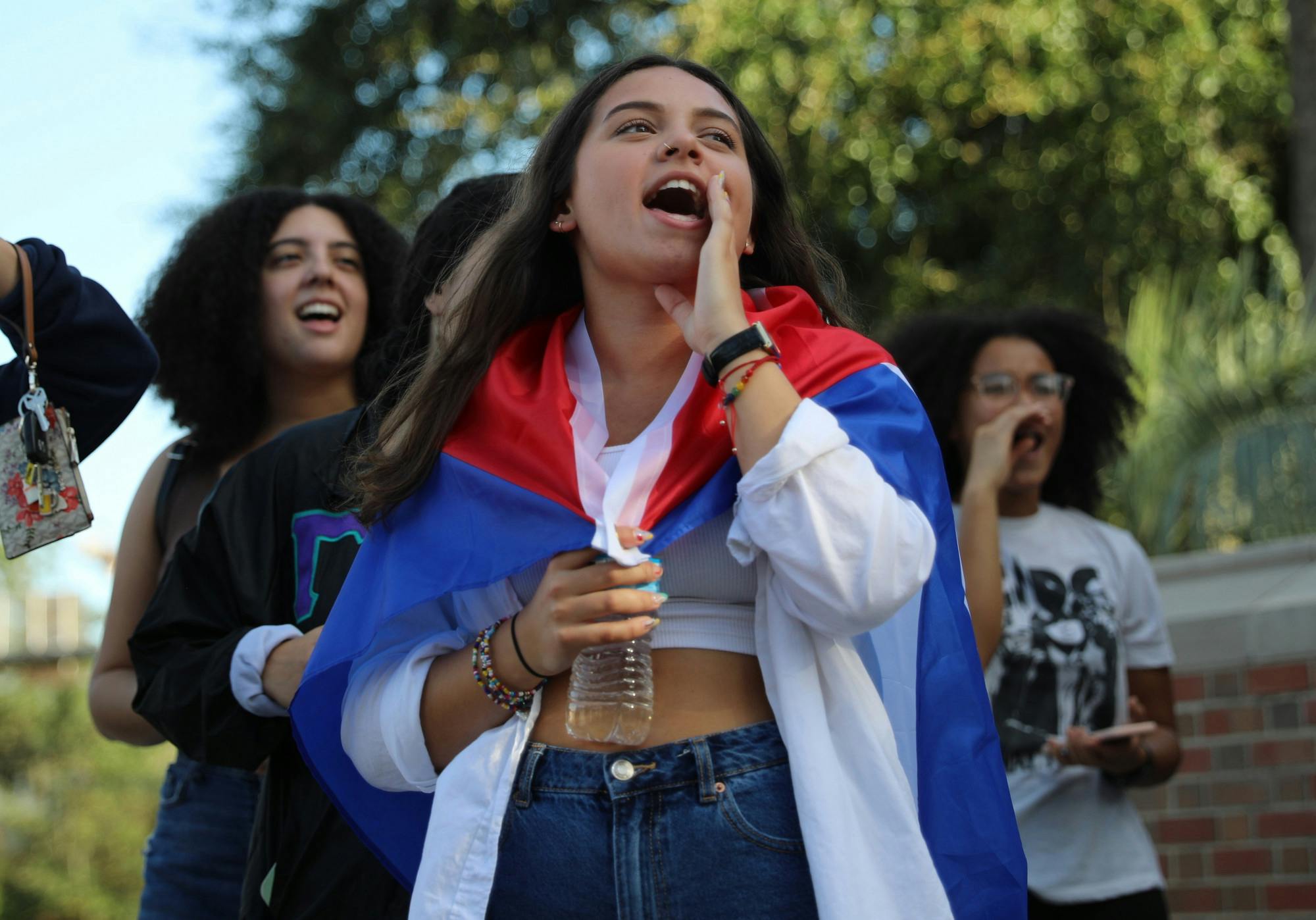
On July 16, U.N. Human Rights Chief Michelle Bachelet urged the government to address the Cuban people’s concerns and release those detained for exercising their fundamental freedoms.
Quintana urges people to amplify Cuban people’s voices while being allies to other countries in humanitarian crises like Haiti, Venezuela, Colombia, Yemen and South Africa.
“We’re all fighting corruption at the end of the day,” she said.
Being Cuban-American and raised in Miami by her immigrant parents, Quintana said seeing the protests in Cuba deeply affected her because of generational trauma passed down through her family.
“Even though I might not know everyone on the island, or know, or have the same connections as my parents do, I still feel it the same way,” she said. “I was raised that way.”
For 28-year-old Cuban-American Daniel Antonio Miguel, being surrounded by the UF Cuban student community as several people spoke and shared their stories brought him to tears.
“I had this tenseness, this sort of uneasiness in my chest, and like screaming out felt so good — screaming out ‘libertad’ felt so good,” Miguel said.
The UF history senior was born and raised in South Florida by his parents who immigrated to the U.S. from Cuba during Fidel Castro’s regime in 1987.
Miguel grew up hearing stories about the struggles of the island from his family, so seeing the protests break out in Cuba inspired him to show support for his community.
“It just felt like I was here in solidarity with my pueblo [town],” he said.
Miguel’s sentiments are shared by other students whose family members experienced Cuba’s government under different leaders firsthand.
Nelson Diaz, a 25-year-old Santa Fe building construction management sophomore, said he left Cuba when he was 14. In Cuba, his dad was a lawyer and his mom a nurse, but they still endured tough conditions. Now, his dad is an electrician and his mom does not work.
“My grandfather, he fought with Fidel in the revolution, and he's just disappointed with everything that has happened — 62 years of dictatorship,” Diaz said.
His grandparents still live in Cuba, and he said it destroys him whenever he talks to them on the phone. He wants to see some kind of humanitarian intervention with the goal of transitioning the island to a democracy.
“We don’t want capitalists, we don’t want a dictatorship, we don’t want any of that. We want the people of Cuba to be able to choose their own president,” Diaz said.
This month’s protests represent an outcry against Cubans’ current reality and their ancestors' history.
It’s common to see families live in the same house through four generations without any maintenance, Gabriel Rivera, who left Cuba five years ago to the day of the July 16 protest, said. Many people there die from houses collapsing on them, he said.
“What happened in Miami, that is a day-to-day in Cuba,” Rivera said.
He said Cubans get indoctrinated into political ideologies at an early age, and many don’t understand life outside the island. The censorship of the internet and media outlets under Castro’s rule has only worsened Cuba’s isolation.
“You see American movies, but you think that that doesn't exist, it's like that cannot be possible, how so many people can have liberty, cars, houses,” Rivera said. “When we’re born there, you don’t struggle, you just live. You start to struggle when you realize what is outside Cuba.”
Contact Alexander Lugo and Camila Pereira at alugo@alligator.org and cpereira@alligator.org. Follow them on Twitter @AlexLugo67 and @CamilaSaPereira.
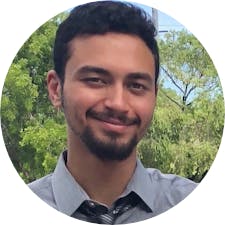
Alex is a fourth-year journalism student at UF and is in his third semester at The Alligator where he is serving as the university editor. He previously reported on university administration and the city and county commission. In his free time, he enjoys video games, traveling and being outdoors.
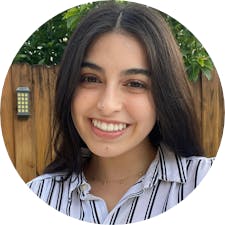
Camila is a third-year journalism student and the administration reporter on the university desk. When she is not reporting for The Alligator, Camila is always listening to music and probably drinking honey milk tea.


